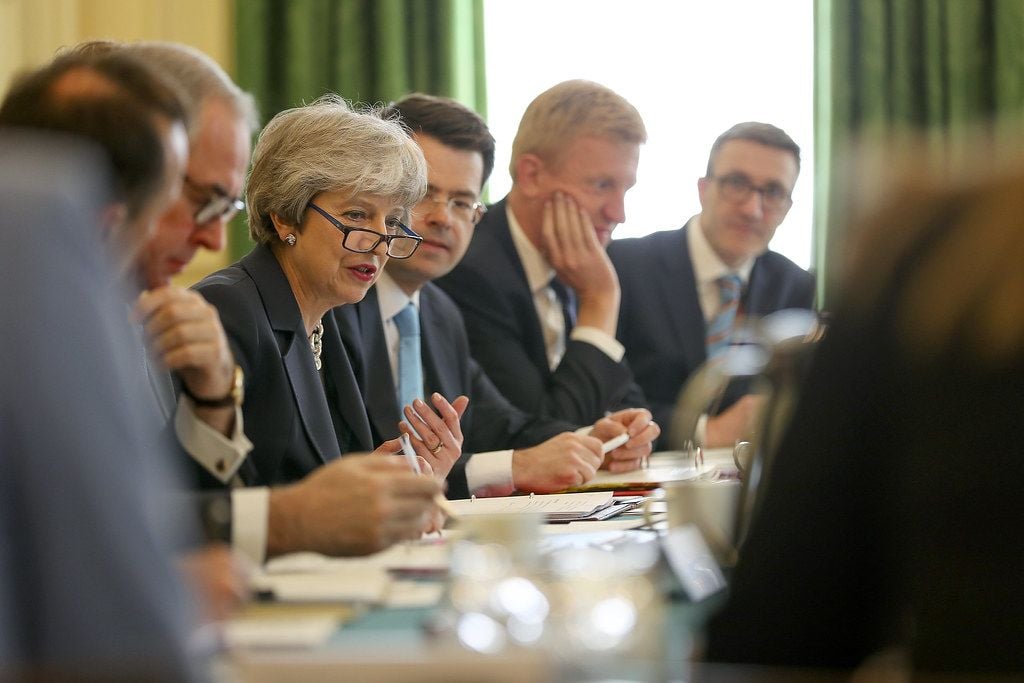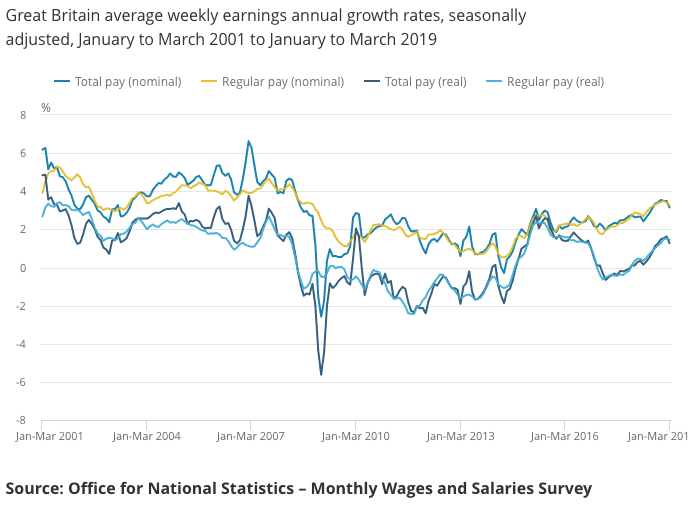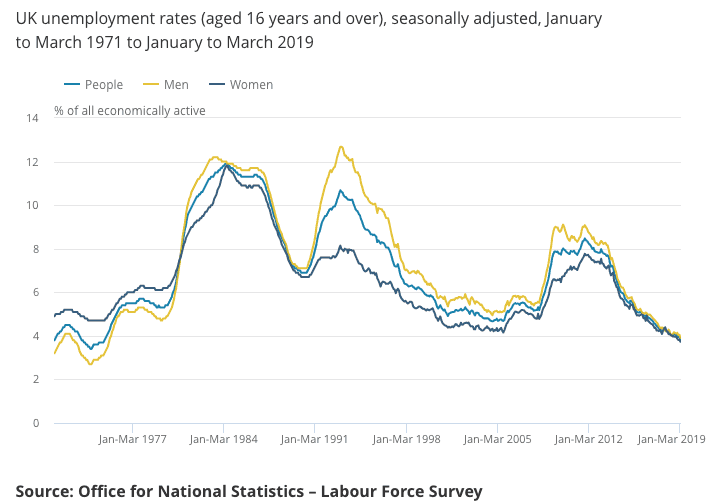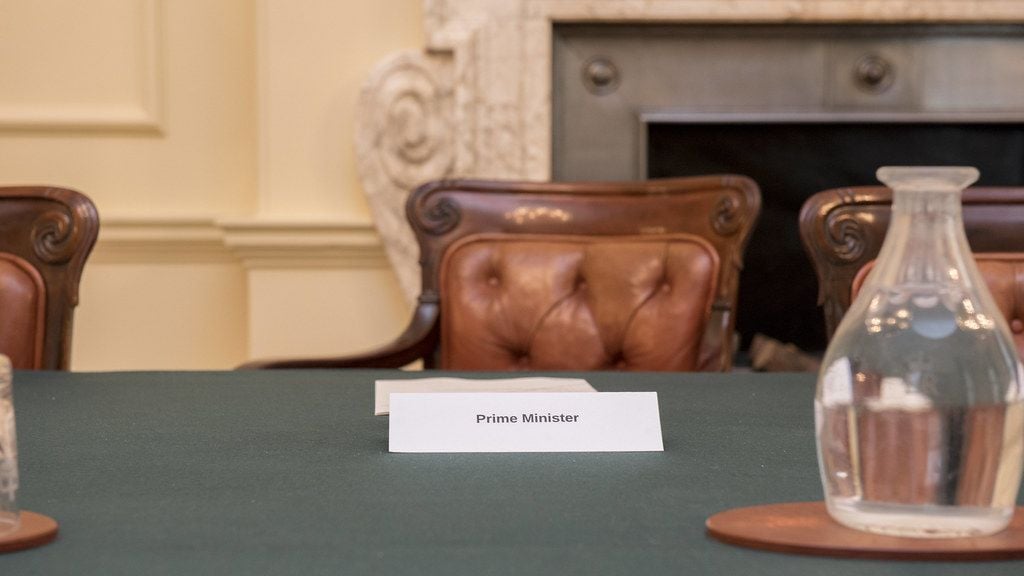Pound Sterling Sell-Off Extends, Wage Data Disappoints

Above: Prime Minister Theresa May will be meeting her cabinet today where ministers are expected to express discontent with cross-party Brexit talks. File photo © Number 10 Downing Street, Gov.UK.
- UK wage data disappoints
- Trade wars heap pressure on GBP/EUR exchange rate
- UK cabinet could pull plug on cross-party Brexit talks
The British Pound was under pressure on Tuesday, May 14 as a cocktail of disappointing employment market data, global trade wars and fading hopes for a cross-party Brexit deal combined to add to the currency's poor run of late.
UK jobs data has disappointed somewhat with both job and wage growth coming in softer than the markets had been forecasting. However, the unemployment rate unexpectedly fell to 3.8%.
UK wages growth read at 3.2% in March report the ONS, below market expectations for a reading of 3.4%.
Employment grew 99K on a rolling three-month-on-three month basis, below expectations for a reading of 141K.
The data will ease pressure on the Bank of England to raise interest rates over coming months as there were growing concerns that accelerating wage growth would push inflation rates sharply higher. The Bank tends to respond to rising inflation with higher interest rates which cool the heating economy.
The side effect of higher interest rates is a higher Pound and those wanting a stronger British Pound were therefore hoping for some stronger numbers that would have raised interest rate hike expectations.

Above: Pay for employees (including bonuses) increased by 1.3% on the year when adjusted for inflation
The Pound has now suffered its sixth daily decline in a row against the Euro and looks to be on course for a seventh with the Pound-to-Euro exchange rate quoted at 1.1516, down 0.20% on the day in the wake of the employment numbers.
Against the U.S Dollar we note Sterling has fallen in five of the past six days with the Pound-to-Dollar exchange rate falling below the pyschologically significant 1.30 mark to read at 1.2943.
"Sterling dropping off again as Average Weekly Earnings ex-bonus falls from 3.4 to 3.3%. This is only 1.5% YoY when adjusting for inflation. Average regular pay for the week has risen to £498 (pre-tax in nominal terms) above last years estimates," says Simon Harvey, a strategist with Monex Europe, adding the data won't move expectations for an interest rate rise at the Bank of England as falling wage growth despite record levels of employment shows how the economy may be further away from capacity than previously estimated.
"Either that, or firms are happy to add workers due to Brexit, but not pay more. Vacancies still elevated," says Harvey.

Above: Unemployment rates have been generally falling for the last five years
"Sterling took its main cue from the lacklustre side of mixed U.K. jobs data. On the bright side, U.K. unemployment fell to fresh multi-decade lows of 3.8%. But wage growth moderated more than expected to 3.2% from 3.5% the previous period. Slower wage growth reduces the likelihood of a Pound-positive hike in British interest rates later this year," says Joe Manimbo, a foreign exchange strategist with Western Union.
Time to move your money? Get 3-5% more currency than your bank would offer by using the services of foreign exchange specialists at RationalFX. A specialist broker can deliver you an exchange rate closer to the real market rate, thereby saving you substantial quantities of currency. Find out more here.
* Advertisement
Trade Wars Hurting Sterling
From a global perspective, the trade war flaring between China and the U.S. is important in that it appears the Euro is a key beneficiary, particularly against the Pound and Dollar.
The single-currency is displaying some 'safe haven' asset qualities of late, tending to gain when the trade war issue flares up, as has been the case since the U.S. shattered the calm by announcing it would proceed with enacting the latest tranche of tariffs on Chinese imports as trade negotiations between the two sides had failed to make material progress.
If additional negative headlines are forthcoming over coming hours and days it could be that further downside pressure is placed on the Pound-to-Euro exchange rate in particular.
Monday brought with it some negative headlines that confirmed the trade war would likely get worse before it gets better:
1) China announced a set of retaliatory tariffs on US goods
2) The Editor in Chief of China’s Global Times tweeted threats that China could stop purchasing U.S. agricultural products and energy, reduce Boeing orders, restrict U.S. service trade and possibly dump holdings of U.S. treasury bonds.
"These are “empty” threats because China is to a degree already engaging in some of those activities and remains the net loser in all of those scenarios," says Trinh.
3) The U.S. meanwhile proposed list of tariffs that would cover nearly every consumer product left untouched by previous tariffs on Chinese imports e.g., cellphones and laptops.
How long the Euro would benefit in these conditions is hard to say, with some analysts saying the Euro's advance could be temporary in nature as ultimately a global trade war will hurt Eurozone exports.
The jury on how the Dollar will perform is however out, with analysts split over whether the Dollar will benefit from its 'safe haven' characteristics, or suffer. Thus far the Dollar has struggled.
"The Dollar could still be vulnerable from a decline in U.S. equities. Here U.S. earnings look vulnerable to some downward revisions later this year and an all-out trade war certainly wouldn’t help. Given a market reasonably long Dollar already on the U.S. macro out-performance story, we’re a little worried that short-term position adjustment could weigh on U.S. assets this week," says Chris Turner, head of FX strategy at ING Group.
While the Dollar has struggled, it has nevertheless enjoyed a 0.88% gain against the U.S. Dollar over the course of the past week, suggesting the Pound has additional domestic considerations weighing.
That domestic consideration is, of course, Brexit.
Cabinet Could Pull Plug on Cross-Party Talks

The Cabinet table in 10 Downing Street. File photo © Number 10 Downing Street, Gov.UK.
Brexit headlines remain unconstructive for Sterling, with expectations of an imminent collapse of cross-party Brexit talks that would leave the UK no closer to achieving a Brexit deal than it was at the start of the year.
Positions are becoming more entrenched as both Labour and the Conservatives try and fend off the newly minted Brexit Party of Nigel Farage which appears to be capturing the vote of Brexit voters who feel disenfranchised by the succession of Brexit delays delivered by the Government and main opposition.
Today's regular meeting of the cabinet should be an important one as the Prime Minister Theresa May is expected to be told by some of her most senior colleagues that is time to pull the plug on the cross-party talks.
"The Cabinet and shadow cabinet tmrw will consider how much progress being made, or whether talks going round and round the same circles - those in the room still say it's possible to see how you could get to agreement, but growing sense of frustration that the politics is choking that off," says the BBC's Political Editor Laura Kuenssberg.
We reported yesteday that the Chancellor Phillip Hammond has already told colleagues that, while "amiable", the talks with Labour are being held on the "false premise" that a politically acceptable deal could ever be struck.
The intervention by one of May's most significant allies on the matter will only likely pile the pressure on the Prime Minister to turn away from cross-party talks and we expect today's Cabinet meeting to be key in this regard.
One Cabinet minister told Kuenssberg, "I just can't see how Labour gets us out of the hole" - another says "we're in a plane with the fuel running out".
The cessation of talks would come as another negative development for Sterling as it lowers the prospect of a Brexit deal being finally voted into legislation.
How much the market is prepared for such an outcome is hard to say, therefore judging the currency reaction is difficult. Our suspicion is that the market is relatively well prepared for failure, therefore the downside risks might already largely be in the value of Sterling.
Thirteen of May’s former cabinet colleagues have meanwhile written to the Prime Minister ahead of today's Cabinet, warning she would sacrifice the “loyal middle” of the party if she struck a deal with Labour to keep Britain in a customs union.
But, May appears determined to press on, and in a sign that she still believes some kind of deal with Labour is possible, she is sending Ollu Robbins, her chief Brexit negotiator, to Brussels on Tuesday to discuss possible changes to the non-binding political declaration on future UK/EU relations.
The cross-party talks have now entered their sixth week, with senior Labour figures telling the Financial Times they are close to collapse. "They are heading for the rocks," said one shadow cabinet member.
The latest round of talks ended on Monday night with "no substantive progress".
Time to move your money? Get 3-5% more currency than your bank would offer by using the services of foreign exchange specialists at RationalFX. A specialist broker can deliver you an exchange rate closer to the real market rate, thereby saving you substantial quantities of currency. Find out more here.
* Advertisement




